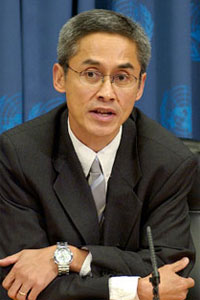Last week, for the first time, the UN Security Council held a special session on the situation of human rights in North Korea (the Democratic People’s Republic of Korea – DPRK). While the range of human rights abuses there are well-known to the international community, the Security Council took years before opting to discuss the issue. It was the voluminous findings of a UN Commission of Inquiry on human rights violations in North Korea, published recently, which propelled it to the top of the UN agenda.
The three-member Commission of Inquiry (composed of Chairperson Judge Michael Kirby, Sonja Biserko and Marzuki Darusman) was established last year by the UN Human Rights Council in Geneva to undertake in-depth inquiries into nine areas of concern: violations of the right to food; prison camps; torture and inhuman treatment; arbitrary arrest and detention; discrimination; violations of the right to freedom of expression; violations of the right to life; violations of the freedom of movement; and enforced disappearances, including the abductions of foreign nationals. The commission’s mandate was to inquire "with a view to ensuring full accountability, in particular where these violations may amount to crimes against humanity".
It had been preceded by country-related monitoring provided by the UN Special Rapporteur on North Korea who had been researching and producing two reports every year and submitted to the UN since 2004.
This year, the commission produced a document of some 370 pages detailing the shocking state of the country headed by a totalitarian regime with tight control over the population.
The political system there is based upon imposition of the cult of leader-worship and a "military first" policy. Much of the country’s resources are misspent on its nuclear programme and huge army. This is paralleled by a very hierarchical system — the Songbun — under which people are categorised into various classes, ranging from those allied to the ruling regime to those relegated to the margins as suspects and enemies of the regime, often exiled to life-long incarceration in prison under sub-human conditions.
The eye-popping range of violations include deprivation of food and starvation under a state-controlled food distribution system; the sending of whole families to political gulags as part of collective punishment; public executions; torture and killings of political prisoners and refugees repatriated to the country; abductions of foreign nationals; clamp-downs on freedom of expression, the media and religious practices, specifically the persecution of Christians; wide informant systems of neighbourhood watches; violence against women and children, including women trafficked and sold in other countries, then repatriated and punished upon return, forced abortions of women pregnant as a result of relations with Chinese men, infanticide and abuses against street children.
Unresolved issues also fester from the Korean War including abductions, family reunions and the lack of a peace treaty between North Korea and that war's protagonists.
The commission found that systematic, widespread and gross human rights abuses have been committed by the country and that many amount to crimes against humanity, giving rise to individual criminal responsibility at the international level.
Given that the judicial system in North Korea is not independent, it is worth exploring a resort to the international justice system, particularly referral to the International Criminal Court (ICC) for prosecution of individual perpetrators.
North Korea is not a party to the Statute of the ICC and is thus not bound by its jurisdiction. The only possible means of referral to that court then, is through the Security Council, as the latter has the power to cover all countries and individuals, irrespective of whether a country has ratified the ICC Statute.
Will the Security Council act on this front? A major obstacle is the use of the veto by some of its members, especially as North Korea borders key international players and many issues are close to home. Yet, the Security Council has occasionally been forthright in acting — such as in cross-referring the names of the president of Sudan as well as the former president of Libya to the ICC.
In the meantime, other actions should be considered. It is essential to sustain the momentum of monitoring of the North Korean human rights situation not only at the UN Human Rights Council and the UN General Assembly but also at the Security Council. The latter should hold periodic sessions on the North Korean human rights situation until there are proven improvements.
If adopting a resolution in the Security Council is too difficult because of the veto threat at this point in time, it should explore the possibility of a presidential statement from the Security Council President calling for key actions, with graduated measures to exert influence for constructive change.
Perhaps a Security Council resolution on unhindered food aid delivery and access to recipients, coupled with technical assistance for food production, food security and environmental capacity-building, may open doors to interaction.
It is high time also for the Office of the UN High Commissioner for Human Rights to have a regional office in Northeast Asia, possibly in South Korea, to facilitate human rights promotion and protection on the dot and on the spot.
Professor Vitit Muntarbhorn is a distinguished scholar at the Faculty of Law, Chulalongkorn University. He has helped the UN in a variety of capacities, including as an expert, consultant and Special Rapporteur.
